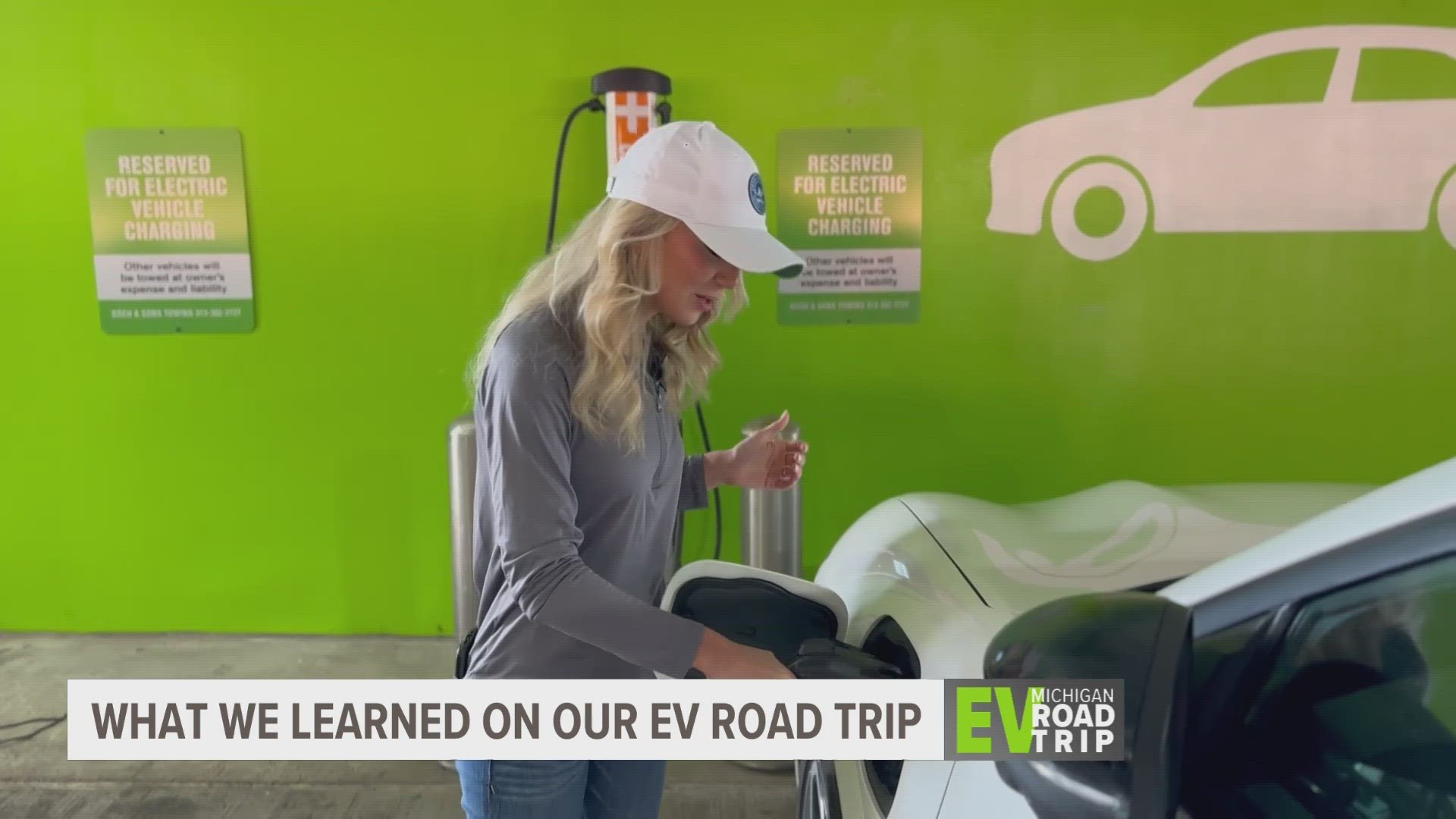GRAND RAPIDS, Mich. — We had hundreds of viewer questions this last week about electric vehicles and here is what we found.
Here are some basic facts to start:
- 1 in 4 consumers are interested in buying an EV (AAA)
- Grand Rapids/Kalamazoo is #7 out of the top 10 metro areas with the most growth in total chargers (iSeeCars)
- EV sales are growing 20% annually (Consumers Energy)
- EVs will make up half of the vehicle sales by 2030 (Consumers Energy)
- The U.S. government invests $1 billion in EV infrastructure each year, at least through 2026 (Federal Highway Administration)
- According to a Climate Power report, 167,000 EV jobs are expected to be created in the next decade in Michigan alone
EV INFRASTRUCTURE
What is the average cost to set up home chargers for the EV?
If you have electricity in your garage and don't mind it being a slow charger, it would only be the price of the charger itself—which is sometimes included when buying the car. If you want it to be a fast charger, it could run anywhere from $1,500 to $3,000. That was an estimate we got from a local electrician.
How much does one of those batteries cost and how long does that battery last before you need a new one?
The battery's life is 10 to 20 years, depending on the amount of mileage, typically between 100,000 and 200,000 miles. It can cost anywhere from $2,000 to $10,000 depending on the battery type.
If the majority of people have EVs, come home after work on an 85-degree day, plug in the car, and turn on the home A/C, where’s all the electricity going to come from? Last summer they asked people out west to conserve electricity, what if they all have EVs?
We are certainly going to need electrical companies to step up to the plate and meet the demand. Luckily, most cars would charge overnight, when you typically see a dip in electricity.
How do you locate charging stations and are they hard to find?
There are several apps that can be downloaded to find different charging stations including PlugShare, ChargePoint, EV Connect and Electrify America. Your Apple and Google Maps will also show you where you can find chargers and how far you can go before needing to charge again.
What happens if there are power outages?
Electrical companies are going to need to step up to the plate to restore power as quickly as possible. EVs can be used as a generator for your home, which is a cool feature, but they will eventually die if you can't find a power source to charge with.
CLIMATE
What's the impact of the batteries on the environment vs. a gas-powered car?
EVs are worse for the environment for the first two years of their lifespan in comparison to gas-powered vehicles. This is because of the battery-making process. After two years, EVs make up for their bad environmental footprint, while gas cars continue to pollute the environment.
Here is the full story on this topic.
Isn't electricity just as bad for our environment as transportation?
Consumers Energy tells us that with the energy they use right now, EVs emit fewer pollutants than gas engines. Plus, their energy is getting cleaner each year—they plan to have net-zero carbon emissions by 2024. And they’re creating more solar farms, wind farms and clean storage options for the future.
ECONOMY
What kind of fees do EV owners pay since they won't be paying gas taxes?
We did question Gov. Gretchen Whitmer's office on this and they said they are working to figure out a plan for that, but as of right now, there is no solution to that problem.
How do we plan to fill the job market created by the EV industry?
Millions of dollars are being spent on building accessible charging stations. On a federal level, the Department of Transportation gave Michigan $110 million just for electric vehicle charging alone. And Gov. Whitmer’s office has given out more than half a million dollars in grants to organizations creating EV infrastructure.
BASICS
Are the costs of EV cars more than the cost of non-EV cars or are they comparable?
Buying new is fairly comparable, especially with the current tax credit. Many car dealerships are pushing to make them cheaper.
Can people pull a trailer, camper or tow things with an EV?
This is a tricky question because trucks are being made that can pull all those things, but it does reduce range—potentially significantly. By how much—that has been tough to get an answer for.
Do fast chargers cost more than regular chargers?
It's about the same because you save so much time and you pay based on the amount of time you charge.
What happens when the EV battery power is exhausted and dies on the open highway like a car when it runs out of gas?
You would need to get a tow. EVs, in the same manner as a car, notify you when you are getting low on charge. It even tells you how many miles you have until you need to charge. Another option would be an EV that could jump your battery.
Does the battery explode when it gets water on it?
No. EVs can drive in rain, snow, ice and even go into car washes.
Do most charging centers charge $$$ for a charge?
There are places that let you charge for free. For example, some dealerships and hotels. They are typically slower/overnight chargers. Otherwise, to get a "quicker" charge, you typically pay per kilowatt hour.
If you have any additional questions about electric vehicles, text CAR to 616-559-1310.
https://www.youtube.com/watch?v=Ne-YUcb2Ods
►Make it easy to keep up to date with more stories like this. Download the 13 ON YOUR SIDE app now.
Have a news tip? Email news@13onyourside.com, visit our Facebook page or Twitter. Subscribe to our YouTube channel.

